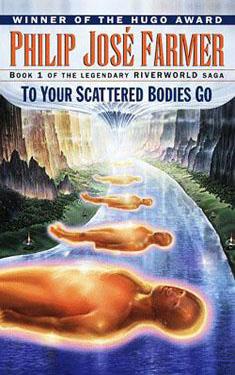Read 3/2013, reviewed 4/21/2013
3 stars
I really loved this book.
The premise is awesome. All the
earth’s “human” inhabitants, past, present, and future, are resurrected into a
world which seems to be controlled by aliens.
The plot is the struggle of a few of these humans to survive this new
environment and figure out what is really going on.
 The key to the story was the struggle to make sense of the
new world, and to not fall into the trappings of recreating “tribes” that are
as uncivilized or even more savage than that in which they lived while on
Earth. Unfortunately, Farmer focuses on
larger concepts such as Nazi-ism and savagery rather than the breaking of
social stereotypes.
The key to the story was the struggle to make sense of the
new world, and to not fall into the trappings of recreating “tribes” that are
as uncivilized or even more savage than that in which they lived while on
Earth. Unfortunately, Farmer focuses on
larger concepts such as Nazi-ism and savagery rather than the breaking of
social stereotypes.
The journey of the hero and his community is an amazing
one. The hero is full of machismo, but
that is what he comes from. He relies on
this to from his own tribe, interact with other tribes, fight the oppression of
evil tribes, even from the 20th century, and find the creators of
this world.
It works. The story
is very engaging. He expects others to
rise from their dark pasts, but only up to the late 19th century,
the era of his origin. Since most of
those he meets and interacts with are from earlier eras, the challenge feels
good. However, he himself is not challenged
to rise beyond that. Even the people
from the future don’t challenge his views of society. They only help him to understand the history
of world from the point of his earthly death forward.
I give this book 3 stars because the premise is so
unique. Some readers take great issue
with the machismo, misogyny, racism, and homophobia in the story. This also bothers me greatly, but having
already read most of the pre-1980 Hugo winners, I’ve come to accept that many
writers were reflecting the society they knew, and often couldn’t rise from
their social myopia. If this book were
written in the last 20 years, I would have had a much more hostile reaction to
it. I realize that if I was an adult in
1972 and read this book at that time, I would have accepted it as being a
normal condition. If Farmer did rise
above his social stereotypes, I’d claim this book to be brilliant. Instead, I’ll call it a really good story.
No comments:
Post a Comment